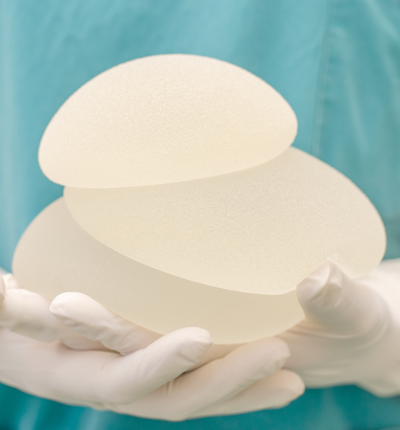
Campaign launched to contact Allergan textured breast implant patients in US
Textured-breast-implants manufacturer Allergan has announced the launch of a digital campaign to identify and contact patients who have received the company's Biocell implants and/or tissue expanders.
Posted on 04 June 2020
The move on 1 June 2020, follows a world-wide voluntary recall of the Allergan Biocell textured breast implants which began 22 July, 2019, and aims to inform patients of the associated risk of Breast Implant Associated Large Cell Lymphoma (BIA-ALCL).
Allergan Aesthetics will use a multi-channel advertising campaign across digital and social media to inform patients of the recall and direct them to the company website for information on how to identify and register their implant type.
At present it appears that Allergan is only targeting Biocell textured breast implant recipients in the US where it is reported that incomplete device tracking data for approximately 52,000 Biocell breast implant units means patients have not been directly informed of the recall.
Patients in the UK will not have received any direct correspondence from Allergan or any other manufacturers to inform them about the recall.
The voluntary recall last year followed a request by the USA regulator the Food and Drug Administration (FDA) which recommends: "If you have no symptoms, we are not recommending the removal of these or other types of breast implants due to the low risk of developing BIA-ALCL. However, if you have any questions, talk to your health care provider.”
Leigh Day has been contacted by and represents women who have developed BIA ALCL from not only Allergan textured breast implants, but also from Silimed and Nagor implants.
The tracking of breast implants in the UK has historically been very difficult given that there was no formal Breast and Cosmetic Implant Registry (BCIR) until 10 October 2016.
The BCIR captures the details of all breast implant procedures completed in England and Scotland by both the NHS and private providers. The BCIR records the details of any individual who has breast implant surgery, for any reason, so they can be traced in the event of a product recall or other safety concern relating to a specific type of implant.
It also allows the identification of possible trends and complications relating to specific implants.
The BCIR was opt-in and required patient consent for details to be placed on the registry, however it became a compulsory system, no longer requiring consent from 14 January 2019.
Therefore the BCIR data set is not a reliable one prior to 14 January 2019. This makes tracing of any women with textured breast implants more difficult. In fact on the foreword of the BCIR 2018 report, reads:
“The efficacy of product recalls based on the Breast and Cosmetic Implant Registry are reliant on the quality of the data that it holds. Product recalls within the registry are only possible based on the manufacturer. As there are currently no validity rules available for device identifier, serial numbers, catalogue reference numbers and lot numbers, it is not possible to carry out a product recall based on these fields.”
Therefore, as it currently stands the BCIR data is not sufficient to track trends and complications relating to specific implants in the UK.
Leigh Day solicitors say it is important that the MHRA looks to and liaises with other healthcare regulators worldwide such as the FDA in the United States, the French medicines regulator (ANSM) whose temporary ban Allergan textured breast implants from the European market in December 2018 led to the implants being banned in England as a result of European legislation and the Australian TDA who report much higher incidence rate of BIA-ALCL per procedure.
Leigh Day solicitors have found that often the women who approach them regarding their implants do not know the band or type of implant they have. Looking at worldwide data and best practice will ensure that women who may be at risk of BIA-ALCL can be proactively traced, contacted and warned of the risk posed by their implants so that should they display symptoms, they can seek medical treatment.
Zahra Nanji, a solicitor instructed by several women who have been diagnosed with BIA-ALCL commented:
‘There is a need for the UK regulator, the MHRA to use its powers to act proactively to ensure that manufacturers of medicines and medical devices actively monitor and report and take responsibility for the safety of their products.
“Although the BCIR has been established, it was some years after the PIP breast implant litigation, meaning that the regulator was slow to respond to creating a system to monitor and protect patient safety.
“Where it becomes evident that there is an issue with a product, the Regulator should require manufacturers and suppliers of devices and medicines to contact their patients and customers and warn them of risks to their health, even where the risk is uncommon.
“Where the Regulator lacks the power to act, then doing nothing is not an option. Suitable powers need to be requested and bestowed upon agencies them to enable them to carry out their function effectively.’
Zahra Nanji commented:
“Through our work with women implanted with Allergan Biocell implants we know that there are very real concerns regarding their risk of developing this uncommon, but potentially terminal, cancer.
“As it stands, our own regulator, the MHRA, has instigated no requirement for surgeons to proactively contact individuals in the UK whom they have implanted with Allergan implants even those these devices have now been removed from the market worldwide due to the known association between lymphoma and Allergan.
“That seems extraordinary, particularly in the light of Allergan’s own actions in the US – and the fact that, as with any cancer, the longer it remains untreated the more dangerous the disease may become.
“Too many women we have spoken to have no idea what type of implant was used for their augmentation procedure – as such many will have no idea that as a result of their implants they remain exposed to a low, but serious risk, of developing BIA-ALCL. The MHRA must do more.”


